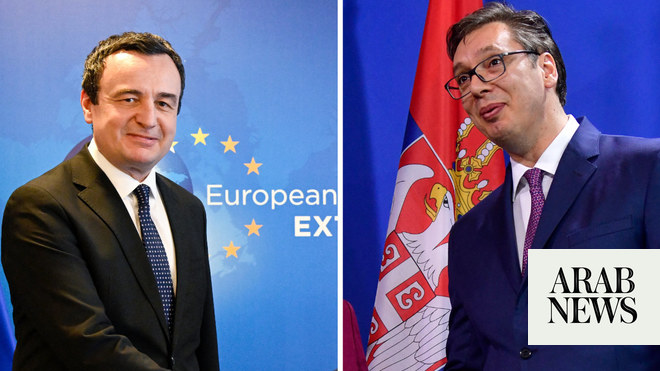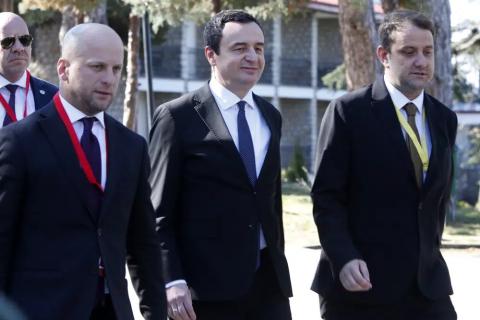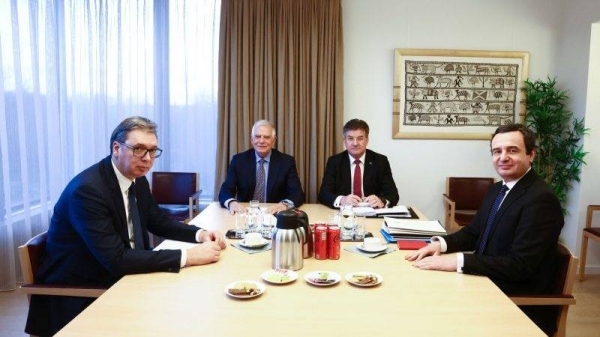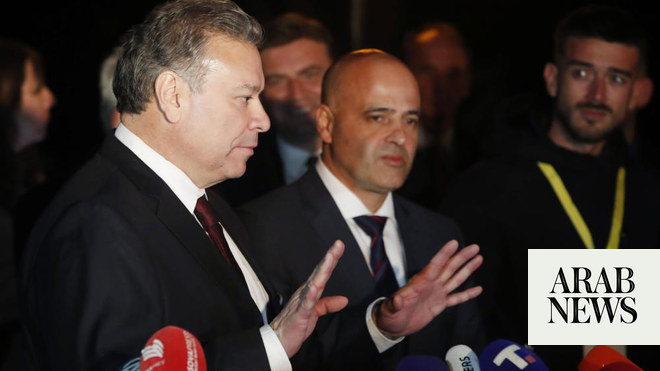
A territory swap had been suggested as part of a package to normalize relations between Serbia and its former province of Kosovo
Tensions remain high in northern Kosovo, where many ethnic Serbs still live
BRUSSELS: Serbia’s president refused to meet with his Kosovo counterpart at European Union-backed talks Friday, dashing hopes of an imminent improvement in long-strained relations between the two countries.
Hopes of a breakthrough had been relatively high after a territory swap had been suggested as part of a package to normalize relations between Serbia and its former province of Kosovo. Only after the two sides have patched up their differences do they stand a chance of becoming a member of the EU.
However, after separate meetings on an array of issues with Serbian President Aleksandar Vucic and Kosovo President Hashim Thaci, the EU’s foreign policy chief, Federica Mogherini, said “difficulties remain.”
Without elaborating, Mogherini said she trusts that both leaders will “continue the process and reach in the coming months a legally binding agreement on comprehensive normalization of relations, in line with international law.”
Behind the scenes in Brussels, there were few signs of a change in the rhetoric.
Marko Djuric, a leading Serbian negotiator, said Vucic refused to meet Thaci because of recent “threats and deceits” from Kosovo.
“There are not minimum conditions to talk to the representatives of Pristina today,” Djuric said.
The dispute between Serbia and Kosovo dates back to 1998-99, when the former Serbian president, Slobodan Milosevic, ordered a bloody crackdown on Kosovo Albanian separatists. More than 10,000 people died in the conflict before NATO forced Serbia to pull out of the territory.
Kosovo declared independence from Serbia in 2008 and is recognized as a nation by more than 100 countries. But Serbia does not recognize it, and neither do five EU countries — Cyprus, Greece, Romania, Slovakia and Spain.
Tensions remain high in northern Kosovo, where many ethnic Serbs still live.
Serbia and Kosovo have been told to sort out their differences if they ever hope to join the EU. Officials from both sides have suggested a land swap could work, but the idea has been criticized both locally and internationally.
The proposal would likely see a part of southern Serbia centered on the ethnic Albanian-dominated city of Presevo transferred to Kosovo, while the Serb-dominated northern part of Kosovo, around Mitrovica, would become part of Serbia.
Some fear that any border changes might trigger similar demands elsewhere in the Balkans, especially in Bosnia, Macedonia and Montenegro, which like Serbia and Kosovo, were part of the former Yugoslavia.
Germany, Austria and Luxembourg have warned that any land swap could open up old wounds in the region. Other EU countries, such as Belgium and Romania, believe it’s up to the two sides to sort things out.
US President Donald Trump’s administration has signaled it would accept any agreement between the two sides.
Zoran Ostojic, an analyst from Belgrade, said he believed that Vucic and Thaci are “testing the ground, primarily with the international community” by floating the swap idea.
“Who knows where that could end?” Ostojic warned, echoing fears of a chain reaction throughout Balkans.
Mogherini is due to chair further high-level talks in Brussels between the sides later this month.










